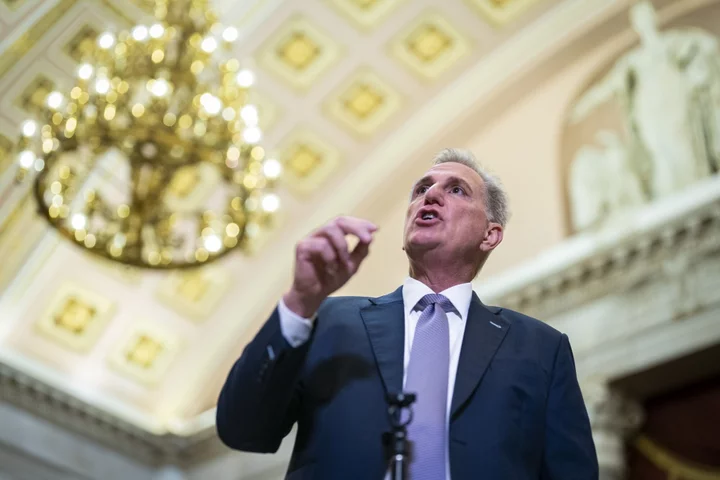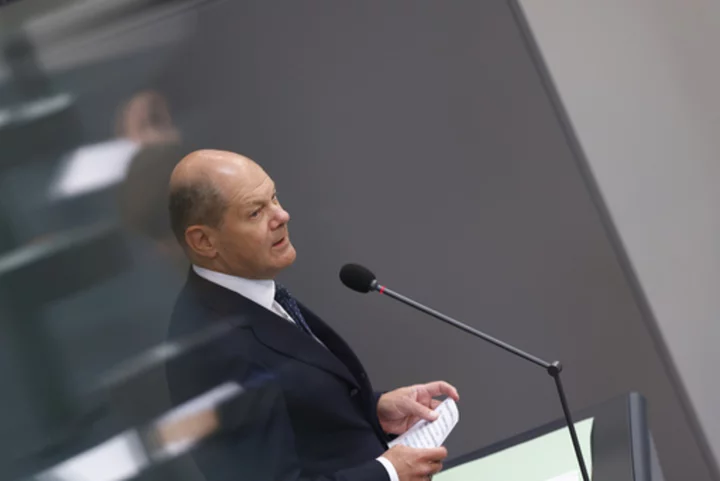The US is on track for an Oct. 1 government shutdown despite incremental progress late Tuesday in the House and Senate on rival spending bills.
Senate leaders introduced their own bill to avert a shutdown and cleared a procedural vote, while House Speaker Kevin McCarthy was able to start House debate on a series of conservative full-year spending bills.
The Senate stopgap bill has no clear path to pass the House, while the speaker has yet to nail down support for his own stopgap measure, which he plans to have the House vote on after the other full-year bills.
The Senate bill would keep the government open through mid-November and provide $6 billion in assistance to Ukraine.
The Senate may not be able to vote its approval for the temporary measure before the Saturday midnight shutdown deadline because Senator Rand Paul, a Kentucky Republican, is threatening to slow it with procedural obstacles over the inclusion of Ukraine aid.
That bill, however, is dead on arrival in the House, where McCarthy could face ouster by conservative hardliners if he allows a bipartisan plan to come to a vote.
Your Questions Answered on US Government Shutdown: QuickTake
The Senate plan, which would extend funding until Nov. 17, falls short of the $24 billion in Ukraine aid requested by President Joe Biden. It includes $6 billion of the $16 billion in emergency disaster relief the White House sought.
Senate Majority Leader Chuck Schumer said the bill was “a bridge, not a final destination,” and that more needs to be done later to address Ukraine and the recovery from a series of hurricanes and wildfires.
“Over the years I have been clear in my view that government shutdowns are bad news,” Senate Minority Leader Mitch McConnell said. “They don’t work as bargaining chips.”
The Senate plans a shortfall in the Women, Infants and Children nutrition program and temporarily extend some expiring farm bill programs. It would also allow the Pentagon to build a second Columbia Class submarine.
The House is focused on trying to pass full-year funding bills for the State, Agriculture, Homeland Security and Defense departments that would not in themselves end the shutdown threat.
McCarthy has said that after spending most of the week on these bills, he plans to bring up a stopgap bill that contains a deep cut to domestic spending and immigration law changes that are anathema to Senate Democrats and the White House.
So far, at least 11 members of his party have indicated they would resist allowing a vote on that measure, preventing consideration unless McCarthy can win over some House Democrats.
Earlier: Shutdown Poised to Delay Billions From Biden’s Climate Law
Moderate House Republicans are preparing to join with Democrats on a rarely used discharge petition to force a vote on a bipartisan effort. The procedure was adopted by the House in 1910 as a check on the speaker’s power and would force a vote on a bill without his approval. Discharge petitions have been successfully deployed just twice this century.
Given their narrow majority, only five Republicans must join with Democrats to bring it about. Thirty-two Republicans have already signed onto a bipartisan bill to finance the government through Jan. 11 and provide military aid to Ukraine. The petition could be used to force a vote on the Senate bipartisan bill.
Representatives Mike Lawler and Marc Molinaro, both New York Republicans who represent areas Democrat Joe Biden carried in the last presidential election, already have publicly threatened to join Democrats in such a petition, and other GOP moderates are ready to do so.
The discharge petition, last deployed successfully in 2015, can be used to force a vote within nine “legislative days” when Congress is actually in session.
--With assistance from Steven T. Dennis.









